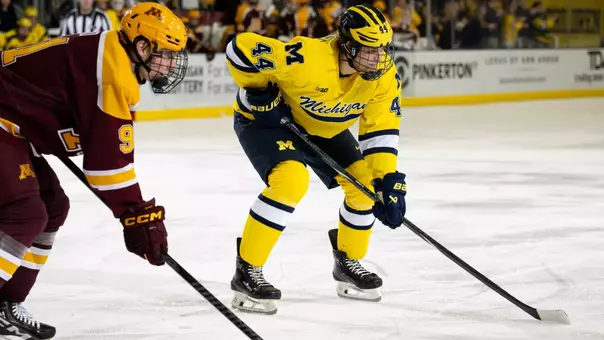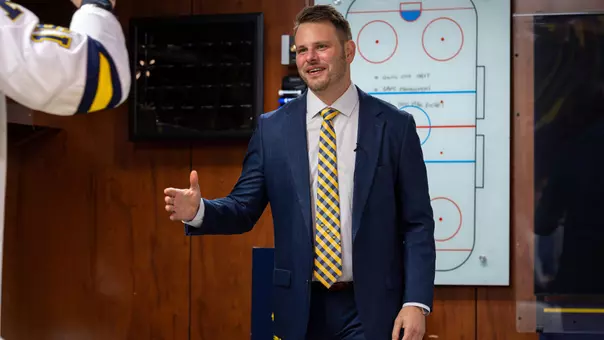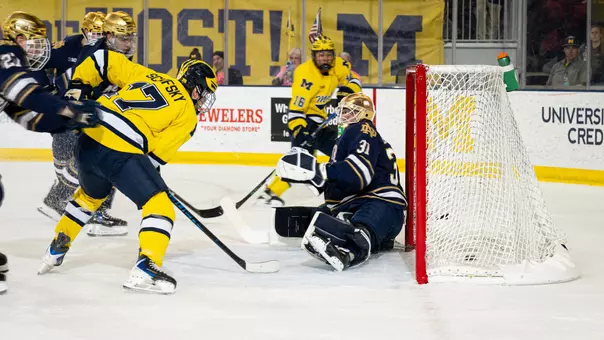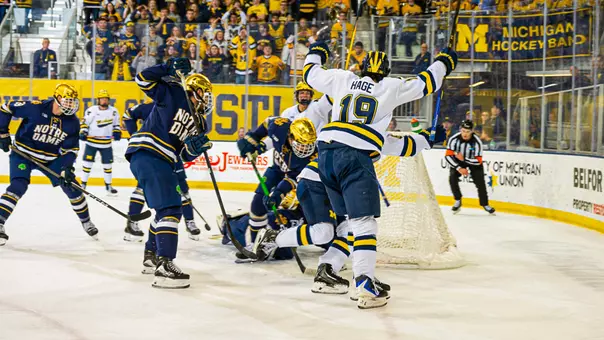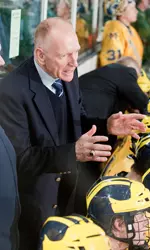
Berenson Knows Concussion Effects First-Hand
12/17/2009 12:00:00 AM | Ice Hockey
Dec. 17, 2009
By Joanne C. Gerstner
Red Berenson knew how to play physical hockey. Slamming into the boards with a violent check, or exchanging a shove or two to get to the puck wasn't anything new. But Berenson also realized his body wasn't going to last if this particular thing kept happening.
Berenson, Michigan hockey's long-time head coach, was playing in one of his first NHL games for the Montreal Canadiens in 1962; he was the first college player to jump straight into the NHL. He had completed an All-America career with the Wolverines, serving as the team's captain and star center. Back in those days, most NHL players did not wear helmets. The few who did wear helmets usually had to because of previous head injuries such as skull fractures. Berenson wore a helmet playing for Michigan, but decided to be like the rest of the Canadiens.
Berenson, sans helmet, went hard into the boards that night and his head landed with a whack against the glass. He immediately knew something was wrong.
"I was very woozy, dizzy and I saw spots in front of my eyes to the point where things were very unclear," Berenson remembers. "I had to get back to the bench, but I really couldn't see well. So I felt my way along the boards and I got back to the bench somehow. I knew something wasn't right with my head, had to be a bad concussion or something. I didn't dare say anything, I was new on the team and I didn't want to give them any reasons to take me out of the lineup.
 The 2009 Summer Hockey Showcase featured alumni from U-M's ice hockey team, including coach Berenson. |
"I played the rest of the game, getting on the ice for my shifts and staying close to the boards just for security. I don't know how I got through it, but I did."
Berenson called back to Ann Arbor after the game, asking the Michigan hockey program for his college helmet. He wasn't going to try to play again without protection.
| "I've had many players go on to be lawyers, surgeons, successful businessmen, which is what should happen with your Michigan education. But if you keep going with that concussion and keep playing, you're endangering the quality of the rest of your life." Coach Berenson |
The helmet arrived. And Berenson intended to wear it. But there was an issue: a macho ethos existed in the old school NHL, an unstated rule that players who wore helmets without having an underlying injury were somehow not brave. In other words, real men didn't wear helmets.
That message was communicated to Berenson by older players and the staff.
"They told me in no uncertain terms that they didn't like me doing that, it meant I was somehow weak. I was sent to the minors soon after," Berenson said. "Can I say for sure that was the reason why? No. But you know it probably didn't help my case to stay up."
The helmet didn't hurt Berenson's overall future, as he went on to win the Stanley Cup with the Canadiens in 1965 and had a successful 17-year career in the NHL.
His personal experience with concussions made him much more attentive when he became a coach though. He understands there is no playing through a concussion, as a player can endanger his overall well-being.

Berenson is concerned about how many players are suffering concussions. Promising careers have been cut short, such as Eric Lindros and former Michigan star Jason Botterill, by multiple concussions.
"You look at where hockey is today, the players are stronger, faster, bigger, and that leads to some hard impacts when they come together," Berenson said. "I think the emphasis of removing fighting has led to players getting even in other ways, like a check or a whack here and there that may be very aggressive. Helmets protect the skull from being broken, but they don't protect from getting that concussion. I do worry about that a lot, it's something our game really has to look at and see if we can find a way to protect our players."
| "All of us know somebody who has been affected by a concussion in this game. It's not something to fool around with. Red knows that first-hand." U-M Hobey Baker Award winner and 12-year NHL veteran Brendan Morrison |
Brendan Morrison, a member of Berenson's 1996 NCAA championship team, has been in the NHL for 12 seasons. He said that NHL players do worry about concussions but realize it is a risk they have to assume to play hockey.
 Berenson was a first-team All-American in 1961 and '62. |
"When you do get a knock to the head, that thought does come: did I get a concussion and how bad is it?" Morrison, a member of the Washington Capitals, said. "For a smaller player like me, the key is to avoid getting hit. I need to stay out of those situations or I can get hurt. But we've all taken those collisions, and we've felt the brunt of them."
Morrison said one of the mainstays of his time at Michigan was knowing Berenson truly cared about his overall health and welfare, not just his talent on the ice.
"Coach is very tough on those things. You can't fool him into thinking you can play when you can't," Morrison, 34, said. "Sometimes you may not appreciate that at the time, but later on, you do. All of us know somebody who has been affected by a concussion in this game. It's not something to fool around with. Red knows that first-hand."
And Berenson adheres to that dictum: players with concussions aren't playing.
"Everybody has a life after hockey, doesn't matter if you make it to the top of the NHL or if you're done after playing here at Michigan," Berenson said. "What matters is can you have a productive life after hockey. I've had many players go on to be lawyers, surgeons, successful businessmen, which is what should happen with your Michigan education. But if you keep going with that concussion and keep playing, you're endangering the quality of the rest of your life.
"I was lucky nothing worse happened to me. But I went and got that helmet to protect myself. I'm glad I did it."
• Jason Botterill: From the Ice to Risk to the Front Office (12/14/09)
Check back Monday (Dec. 21) for a feature on the U-M Medical School's effect on the issue.

